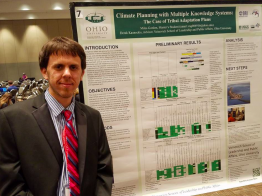Environmental Studies student presents on climate change adaptation at national conference
Graduating student Miles Gordon, a Master of Science in Environmental Studies candidate, presented his research on climate change adaptation planning for native tribes in front of a national audience for the Sixth Annual Rising Voices Workshop.
Held in Duluth, Minnesota from April 11th to 13th, the annual workshop is sponsored by the National Center for Atmospheric Research and brings together participants from across the nation. It provides a place for vital discussions of the climate change challenges facing Indigenous peoples, current adaptation strategies, protection of Indigenous knowledge and sustainable Indigenous practices. This year’s workshop included tribal climate change adaptation practitioners from more than 100 different tribal governments, academic research centers and nonprofit organizations.
“The conference was a fascinating opportunity to hear from participants the need to directly engage community end-users in climate modeling,” Gordon said. The conference emphasized the importance of engaging tribal communities more actively in scientifically driven climate planning processes.
Gordon’s research compares currently existing tribal climate change planning documents from 34 different communities to examine how traditional and scientific knowledge have been integrated into tribal climate planning strategies. He has found that plans in which representation plays a key role in the formation of effective adaptation strategies are most effective, and that even tribes with barriers like low funding or small governments can create a climate plan or perform a vulnerability assessment.
Gordon also had the opportunity to network and interact with a diverse group of researchers, practitioners, and tribal members at the workshop.
“I was proud to represent the Voinovich School’s model of engaged scholarship at this workshop. It lined up well with the workshop’s goals of advancing tribal climate adaptation efforts on the ground level,” Gordon said.
The Native Waters on Arid Lands Project, a USDA grant to build tribal capacity for climate change adaptation in the American Southwest, funded Gordon’s research. He has previously presented his research on tribal climate change adaptation planning at the 2017 National Adaptation Forum, the 2017 Annual Meeting of the Rural Sociological Society and the 2017 Native Waters on Arid Lands Tribal Summit.
Gordon successfully defended his research as his master’s thesis this year and his plans for the future include publishing his research in a peer-reviewed journal, having his work archived in the Native Waters on Arid Lands project database, and participating in a series of webinars with the Institute for Tribal Environmental Professionals.
